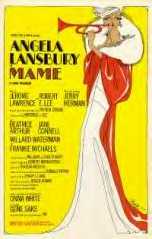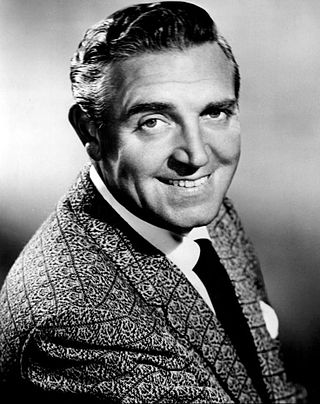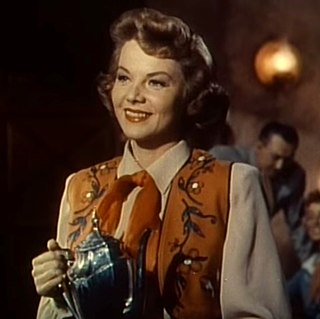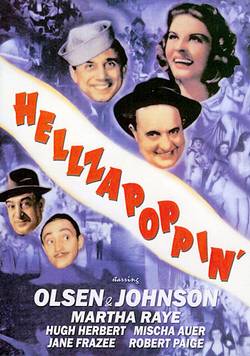
This is a list of notable events in music that took place in the year 1942.

Mame is a musical with the book by Jerome Lawrence and Robert Edwin Lee and music and lyrics by Jerry Herman. Originally titled My Best Girl, it is based on the 1955 novel Auntie Mame by Patrick Dennis and the 1956 Broadway play by Lawrence and Lee. A period piece set in New York City and spanning the Great Depression and World War II, it focuses on eccentric bohemian Mame Dennis, whose famous motto is "Life is a banquet and most poor sons of bitches are starving to death." Her fabulous life with her wealthy friends is interrupted when the young son of her late brother arrives to live with her. They cope with the Depression in a series of adventures.
The swing era was the period (1933–1947) when big band swing music was the most popular music in the United States. Though this was its most popular period, the music had actually been around since the late 1920s and early 1930s, being played by black bands led by such artists as Duke Ellington, Jimmie Lunceford, Bennie Moten, Cab Calloway, Earl Hines, and Fletcher Henderson, and white bands from the 1920s led by the likes of Jean Goldkette, Russ Morgan and Isham Jones. An early milestone in the era was from "the King of Swing" Benny Goodman's performance at the Palomar Ballroom in Los Angeles on August 21, 1935, bringing the music to the rest of the country. The 1930s also became the era of other great soloists: the tenor saxophonists Coleman Hawkins, Ben Webster and Lester Young; the alto saxophonists Benny Carter and Johnny Hodges; the drummers Chick Webb, Gene Krupa, Jo Jones and Sid Catlett; the pianists Fats Waller and Teddy Wilson; the trumpeters Louis Armstrong, Roy Eldridge, Bunny Berigan, and Rex Stewart.
"Civilization" is an American traditional pop song. It was written by Bob Hilliard and Carl Sigman, published in 1947 and later included in the 1947 Broadway musical Angel in the Wings, sung by Elaine Stritch. The song is sometimes also known as "Bongo, Bongo, Bongo ", from the first line of its chorus. The sheet music gives the title as "Civilization ".

Gloria Jean was an American actress and singer who starred or co-starred in 26 feature films from 1939 to 1959, and made numerous radio, television, stage, and nightclub appearances. She may be best remembered for her appearance with W. C. Fields in the film Never Give a Sucker an Even Break (1941).
"I Whistle a Happy Tune" is a show tune from the 1951 Rodgers and Hammerstein musical, The King and I. It is sung by the Governess Anna Leonowens to her son Louis after the curtain rises on Act One of the musical, to persuade him not to be afraid as they arrive in Siam to serve the King.
Susan Margery Jeaffreson Lloyd was an English model and actress, with numerous film and television credits. She may be best known for her long-running role as Barbara Hunter in the British soap opera Crossroads and Cordelia Winfield in the ITC series The Baron.
"I'll Remember April" is a popular song and jazz standard with music written in 1941 by Gene de Paul, and lyrics by Patricia Johnston and Don Raye. It made its debut in the 1942 Abbott and Costello comedy Ride 'Em Cowboy, being sung by Dick Foran. The lyric uses the seasons of the year metaphorically to illustrate the growth and death of a romance. The lyric also uses the ideas of the hours in a day and the flames of a fire to illustrate a relationship growing stronger and subsequently losing strength. Another interpretation is the use of spring to express the loves that were had in youth and remember them when the autumn of life arrives with affection and nostalgia, smiling: "I'll remember April and I smile". The song has been described as one which makes use of nostalgia.

7 Women, also known as Seven Women, is a 1966 Metro-Goldwyn-Mayer Panavision drama film directed by John Ford and starring Anne Bancroft, Sue Lyon, Margaret Leighton, Flora Robson, Mildred Dunnock, Betty Field, Anna Lee, Eddie Albert, Mike Mazurki and Woody Strode. It was produced by Ford and Bernard Smith from a screenplay by Janet Green and John McCormick, based on the short story "Chinese Finale" by Norah Lofts. The musical score was conducted by Elmer Bernstein and the cinematography was handled by Joseph LaShelle. This was the last feature film directed by Ford, ending a career that had spanned 53 years.

Robert Paige was an actor and a TV newscaster and political correspondent and Universal Pictures leading man who made 65 films in his lifetime.

Hollywood Canteen is a 1944 American musical romantic comedy film starring Joan Leslie, Robert Hutton, Dane Clark and features many stars in cameo roles. and produced by Warner Bros. The film was written and directed by Delmer Daves and received three Oscar nominations.

Mary Jane Frehse, was an American actress, singer, and dancer.

When Johnny Comes Marching Home is a 1942 musical film directed by Charles Lamont and starring Allan Jones and Jane Frazee. The film is loosely based on the song with the same title.

Hellzapoppin' is a 1941 American meta musical comedy film, and an adaptation of the stage musical of the same name that ran on Broadway from 1938 to 1941. The film is directed by H. C. Potter and distributed by Universal Pictures. Although the entire Broadway cast was initially slated to feature in the film, the only performers from the stage production to appear in the film were lead actors Ole Olsen and Chic Johnson, and the specialty act Whitey's Lindy Hoppers.

Two Girls and a Sailor is a 1944 American musical film directed by Richard Thorpe and starring Van Johnson, June Allyson and Gloria DeHaven. Set on the American homefront during World War II, it's about two singing sisters who create a lavish canteen to entertain members of the military, thanks to financial contributions from a mysterious donor. The picture features a host of celebrity performances, including Jimmy Durante doing his hallmark "Inka Dinka Doo", Gracie Allen, and Lena Horne. Richard Connell and Gladys Lehman were nominated for the Academy Award for Best Original Screenplay.
Get Hep to Love is a 1942 musical film starring Gloria Jean, Donald O'Connor, Jane Frazee, Robert Paige and Peggy Ryan. The film was directed by Charles Lamont.

San Antonio Rose is a 1941 American black-and-white musical film starring Jane Frazee and featuring Lon Chaney Jr. and Shemp Howard; it was also designed as a showcase for the then-popular vocal group The Merry Macs. The plot involves two rival groups of entertainers converging on an abandoned roadhouse with the intent to reopen it, unaware that a gangster is eyeing the property for his own scheme.
Mister Big is a 1943 musical directed by Charles Lamont, starring Donald O'Connor, Gloria Jean and Peggy Ryan. The film features the song "Rude, Crude, and Unattractive".
"La Cinquantaine" is a piece of music which was composed by Jean Gabriel-Marie in 1887.
The DeMarco Sisters were an American close harmony singing group of the big-band era who recorded popular music and performed in concerts and on the radio, television, and on film from the 1930s through the 1960s. They first achieved fame as weekly performers on The Fred Allen Show from 1946 to 1949, and were featured singers in the 1952 film Skirts Ahoy! with actress Esther Williams. The group was initially composed of five biological sisters. Music critics have compared their sound and style to that of The King Sisters. They made recordings for Majestic Records and Mercury Records among other labels.











